“Following the principle of postponing the new school term with non-stopping teaching and learning, and taking the school’s teaching realities into consideration, the School of Foreign Studies strives to implement this semester’s train plan and teaching plan effectively, orderly, quality and quantity guaranteed during the period of epidemic prevention and control.” 125 full-time teachers from the School of Foreign Studies, UPC, who teach English, Russian, Japanese, French, German, Korean, Arabic and Spanish for students from 15 teaching departments of the university, integrate the current affairs about the battles against Coronavirus into their teaching to further promote the ideological and political construction in classes.
Learning about current situation of 2019-nCoV from the perspective of foreign languages
Teaching students to tell stories about Chinese battles against 2019-nCoV with proper expressions and to learn about how the world fight with the Coronavirus through foreign reports, teachers from the School of Foreign Studies expand their teaching contents in time according to the situation of epidemic prevention and control, and provide students withthe latest and accurate information.
“What is the official English expression of this novel coronavirus pneumonia?” “What does the PHEIC refer to?” “How to express ‘confirmed case, suspected case, first-generation and second-generation case’ in English?” These are questions in the audiovisual and speaking course of 2018 English major. Xu Xiaoyan, associate professor from the School of Foreign Studies, acquires teaching materials from English news. “My selection relies on the authority and diversity of video content, the accuracy of pronunciation and the acceptability of my students”, Professor Xu said.
“As a student majored in English, when encountering with new words, I’d like to learn more about them. However, there are so many materials online with different reference values. Teachers always summarize correct versions for us, which is of great help.” Liu Luyao from 2018 English major said.
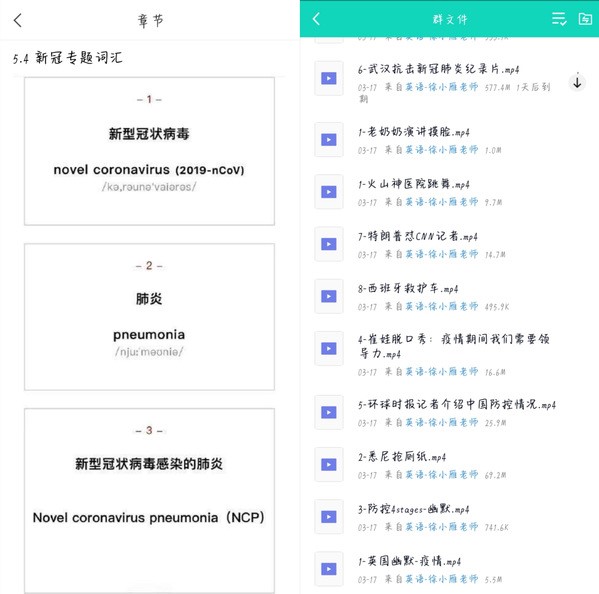
Xu Xioayan, associate professor of the Department of English Language and Literate, provides vocabularies and videos about COVID-19 for students
Songjie, the Japanese teacher from the School of Foreign Studies, teaches the use of number with the examples like “the number of new confirmed cases in Tokyo, the age distribution of confirmed cases, the number of death and their age distribution”, which is the information on Japan authoritative websites.
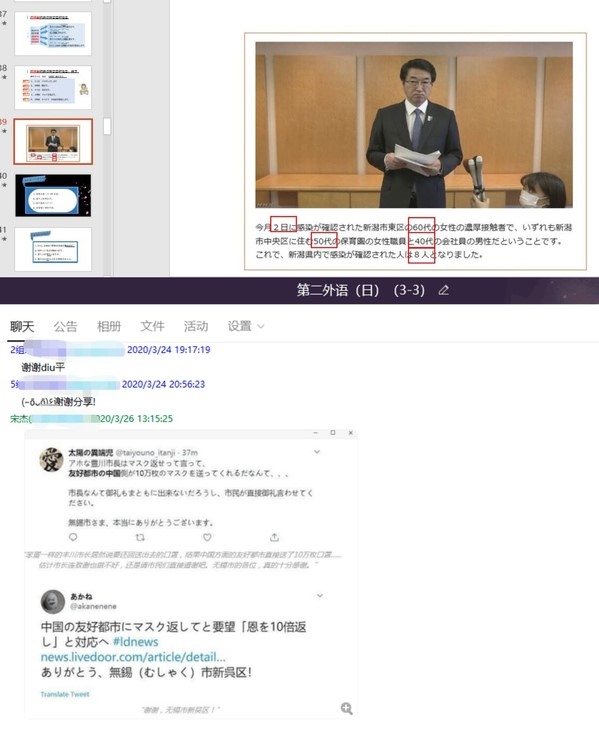
Japanese teacher Song Jie explains the use of number in Japanese based on the current epidemic situation in Japan and updates real-time news to students
Meng Honghong, the teacher from Russian Language and Literature Department, introduces the curriculum vocabulary into the example sentences. The epidemic prevention and control measures of China, the fearlessness and responsibility of health workers, the lockdown measurement of China, and the “epidemic” effect of China are displayed in her class.
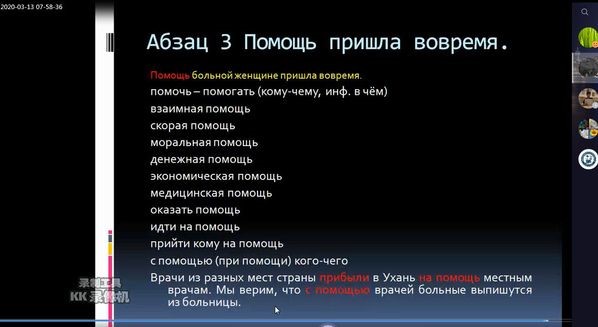
The picture shows the words learning provided by Meng Honghong
In Basic Foreign Language and Reading and Writing of Academic English, Shen Dan, the teacher from the Foreign Language Teaching Department of postgraduates, selects English articles on the prevention of 2019-nCoV, and assigns exercises such as topic discussion and translation.
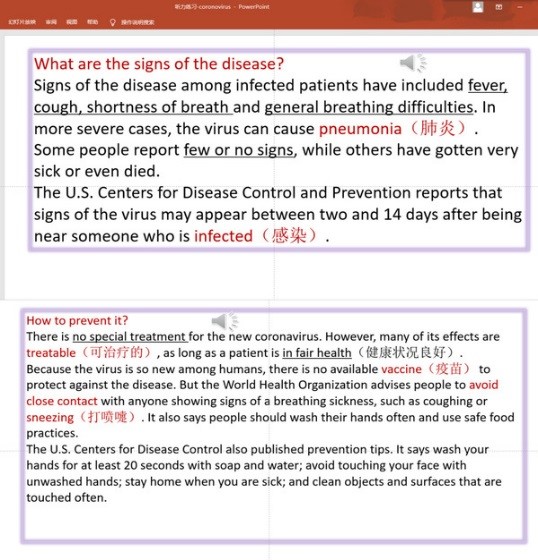
The picture shows the listening practice of 2019-nCoV for students
From the 20 seconds video of hand washing to the voice of China to the world and the warm support of foreign friends, to the discussion of 2019-nCoV in foreign media, Guo Yueqin, the professor the the Foreign Language Teaching Department of postgraduates, always shares the real positive information of the epidemic and remains active exchanges of the video content with the students.

The picture shows the learning video provided by Guo Yueqin
The source of 2019-nCoV English name, the characteristics of the virus, the symptoms of the diagnosed patients, the types of diseases caused, the prevention and treatment plan have become the class contents progressed by the teachers of School of Foreign Studies. From the rumor analysis at the beginning of the outbreak to the discussion of vaccine research and development in the middle of the “epidemic”, and the recent assumption of “group immunity” in the UK, Niu Liwei, the teacher from the first Department of College English, has selected different morning reading materials with epidemic changes for the students.
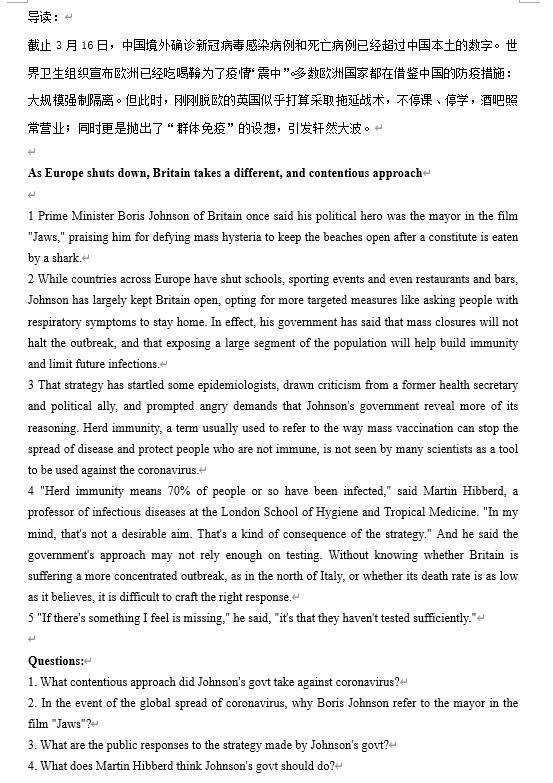
The picture shows morning reading materials provided by Niu Liwei
Guide students to take on responsibilities bravely
Bring social events into the classroom, teachers from School of Foreign Studies say that university teachers should guide students to pay attention to current issues, understand social hot spots, and properly educate them on values.
Song Jie, the teacher who teaches Japanese, says that “I hope to improve the students’ ability to analyze current affairs, national conditions and culture by analyzing the contents of the report, and then focus on the international community to discuss the expression of China’s responsibility, wisdom and plan in this epidemic, so as to carry out the patriotic education to the students subtly.”
Different countries have adopted different policies and ways to deal with the spread of 2019-nCoV, which reflects the social differences under different cultural backgrounds.
Gu Lina, a teacher of College English Department, selected and showed the English documentary on Wuhan's fight against the 2019-nCoV to the students in order to let them understand that the extensive and profound Chinese culture will give us strength to move forward in times of crisis. She said that the sense of national belonging is a necessary Psychosocial need.
By introducing real language materials of current events into the classroom to inspire students, Liu Ruiqin, the professor College English Department, combined the classroom theme with the story of fighting against the epidemic, so as to make students know the necessity of international cooperation in the global war against the epidemic.
Taking Silent Spring, the earliest article advocating environmental protection in the 20th century, as the main part, Wang Haixia, the teacher from English language and literature, explained to the students that when facing the major events threatening the survival and development of mankind, we can only achieve the final victory by moving forward hand in hand.
Zhang Yongning, the secretary of the party committee of the School of Foreign Studies, said that the party committee of the Foreign Language Department has been promoting the construction of ideological and political courses and encouraging teachers to combine knowledge imparts with value guidance in teaching. The fight against the covid-19 epidemic has provided abundant materials for us to carry out ideological and political courses. The teachers of the School of Foreign Studies have a strong education consciousness. Seizing this major public crisis, they timely connected the typical characters and deeds in the struggle against the epidemic with the classroom teaching content, and ideological and political education was integrated into the online classroom”, he said.
Talking about the recent English class, Wang Zehuan, a student majoring in surveying and mapping engineering in college of earth science and technology in 2019, said, In the class, the teacher set a lot of special topics about the fight against epidemic for us. After learning how other countries deal with the epidemic, I felt touched.The motherland is our common home, focus on doing big things, for their love of the land and people to struggle.
Translators: Tian Mengjie, Ma Junling, Yu Jingwne
Proofreader: Fu Xiao
Tutor: Fu Xiao



